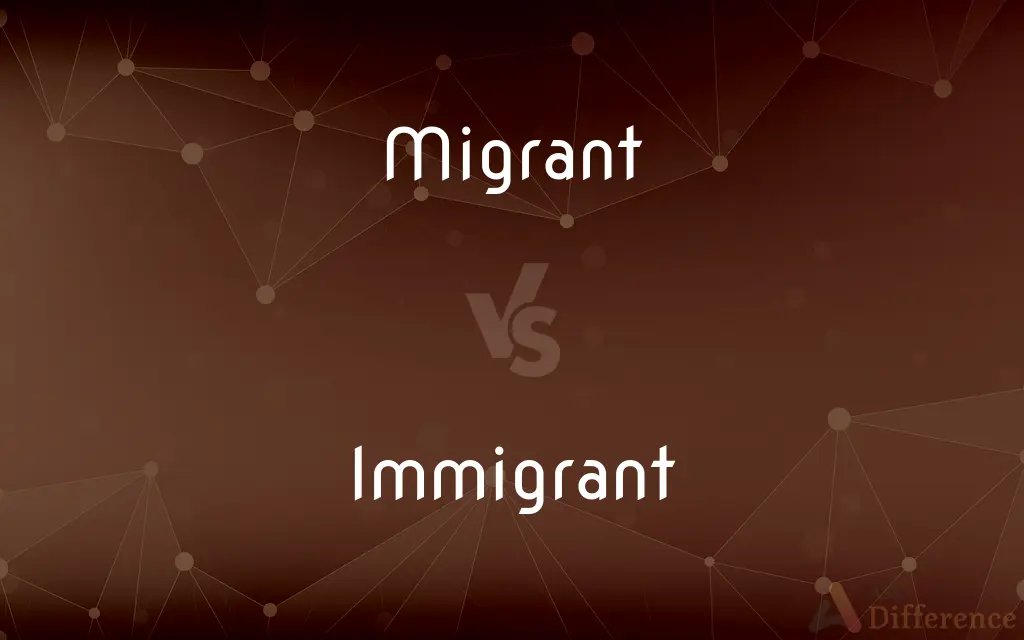Migrant vs. Immigrant — What's the Difference?
By Tayyaba Rehman — Published on January 4, 2024
A migrant moves from one place to another often for temporary work, while an immigrant moves to a new country with the intent to settle there.

Difference Between Migrant and Immigrant
Table of Contents
ADVERTISEMENT
Key Differences
A migrant is generally someone who moves from one region or country to another, often for seasonal work. This term does not imply permanent relocation. For example, a migrant might travel between countries for agricultural jobs without the intention of settling permanently in the destination.
An immigrant is an individual who has moved to another country, usually with the intention to live there permanently. Unlike migrants, immigrants undergo legal processes to establish residency, reflecting a long-term commitment to their new country. An immigrant’s move is usually for the purpose of settling and possibly obtaining citizenship.
Migrants are typically associated with the movement that is temporary or seasonal in nature. They may be driven by economic needs, seeking opportunities or escaping unfavorable conditions at home. Migrants may retain their primary residence in their country of origin.
Immigrants, however, are distinguished by their pursuit of a new permanent home. They often undertake a legal process to obtain rights and privileges in the new country, including working rights, residency, or citizenship. Immigrants contribute to the cultural and demographic makeup of the destination country.
The term migrant can encompass a wide range of movements, including internal migration within a country. Immigrant, however, specifically refers to entering a foreign country with the intent to remain there. While all immigrants are migrants due to their act of moving, not all migrants are immigrants due to the often temporary nature of their relocation.
ADVERTISEMENT
Comparison Chart
Definition
Moves to work or temporarily reside.
Moves to settle and reside permanently.
Duration of Stay
Temporary or seasonal.
Long-term, often permanent.
Legal Status
May or may not change legal status.
Usually seeks legal residency or citizenship.
Type of Movement
Can be internal or international.
Always international.
Intent
Work or temporary necessity.
Permanent resettlement.
Compare with Definitions
Migrant
Someone fleeing adverse conditions
The drought has forced many to become migrants.
Immigrant
Individual building a life abroad
Immigrants often face challenges with adaptation.
Migrant
An individual moving within a country
Internal migrants are shifting to urban areas.
Immigrant
New resident seeking citizenship
She is an immigrant aspiring to be a citizen.
Migrant
Person moving for work
Migrant workers harvest crops each season.
Immigrant
Person settling in a new country
The immigrant found a new home in the city.
Migrant
Someone relocating temporarily
She became a migrant to follow the job market.
Immigrant
Someone leaving their native country
As an immigrant, he embraced the new culture.
Migrant
A traveler without a permanent home
Nomadic lifestyles make them perpetual migrants.
Immigrant
A newcomer integrating into society
The immigrant opened a restaurant in town.
Migrant
An organism, especially an animal, that moves from one region to another (as for breeding) or that has established itself in an area where it previously did not exist.
Immigrant
A person who leaves one country to settle permanently in another.
Migrant
An itinerant worker who travels from one area to another in search of work.
Immigrant
An organism that establishes itself in an area where it previously did not exist.
Migrant
A person who leaves one country to settle permanently in another; an immigrant.
Immigrant
Of or relating to immigrants or the act of immigrating.
Migrant
Migratory.
Immigrant
A non-native person who comes to a country from another country to permanently settle there.
Migrant
A migratory animal, in particular a migratory bird.
Immigrant
A plant or animal that establishes itself in an area where it previously did not exist.
Migrant
Traveller or worker who moves from one region or country to another.
Immigrant
Of or relating to immigrants or the act of immigrating.
Migrant
(informal) A person who leaves one place in order to permanently settle in another.
Immigrant
One who immigrates; one who comes to a country for the purpose of permanent residence; - correlative of emigrant.
Migrant
Any of various pierid butterflies of the genus Catopsilia. Also called an emigrant.
Immigrant
A person who comes to a country where they were not born in order to settle there
Migrant
Migratory.
Migrant
Migratory.
Migrant
A migratory bird, person, or other animal.
Migrant
A person who changes residence frequently in search of employment, especially farm labor, such as harvesting crops seasonally; also called migrant laborer or migrant worker. Sometimes the migrant worker is not a resident of the country in which the work is performed.
Migrant
Traveler who moves from one region or country to another
Migrant
Habitually moving from place to place especially in search of seasonal work;
Appalled by the social conditions of migrant life
Migratory workers
Common Curiosities
Can a migrant become an immigrant?
Yes, if a migrant decides to settle permanently in the new country.
What is the main reason people become migrants?
Economic opportunity, seasonal work, or to escape from hardships.
How does the government classify migrants?
Governments have various classifications for migrants, often based on the purpose and duration of their stay.
Is the term migrant or immigrant used for someone fleeing persecution?
They may initially be considered migrants, but if seeking asylum, they can become immigrants or refugees.
What defines a migrant?
A migrant is someone who moves to a different place, typically for temporary work or seasonal jobs.
What defines an immigrant?
An immigrant is a person who moves to a new country with the intention of permanent residency.
Do migrants always cross international borders?
No, migrants can move within the same country, known as internal migration.
Do migrants have to go through legal processes?
Migrants might go through some processes, but not necessarily those associated with permanent residency.
What rights do migrants have in the new location?
Rights vary widely depending on their status, which can be quite limited compared to citizens.
Are all immigrants also migrants?
Yes, immigrants are migrants because they move from one country to another.
Can an immigrant return to their country of origin?
Yes, but they maintain their residency status in the new country.
Are immigrants always legal residents?
Immigrants have typically gone through or are in the process of legal residency or citizenship procedures.
What rights do immigrants have?
Once legal processes are complete, immigrants have rights similar to other residents or citizens.
How does the government classify immigrants?
Immigrants are classified based on their residency status and are usually on a path to permanent residency or citizenship.
What kind of documentation is required for migrants versus immigrants?
Migrants may only need work permits or temporary visas, while immigrants require residency documents and possibly visas that lead to citizenship.
Share Your Discovery

Previous Comparison
Surface Water vs. Groundwater
Next Comparison
Catholic Church vs. Protestant ChurchAuthor Spotlight
Written by
Tayyaba RehmanTayyaba Rehman is a distinguished writer, currently serving as a primary contributor to askdifference.com. As a researcher in semantics and etymology, Tayyaba's passion for the complexity of languages and their distinctions has found a perfect home on the platform. Tayyaba delves into the intricacies of language, distinguishing between commonly confused words and phrases, thereby providing clarity for readers worldwide.














































